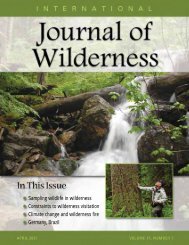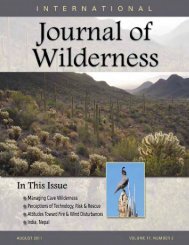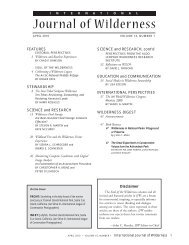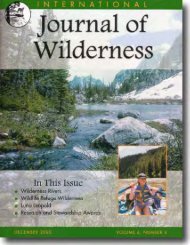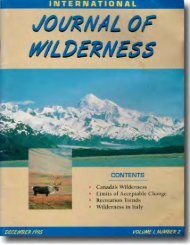P3-Vol 2.No3 Dec 96 - International Journal of Wilderness
P3-Vol 2.No3 Dec 96 - International Journal of Wilderness
P3-Vol 2.No3 Dec 96 - International Journal of Wilderness
You also want an ePaper? Increase the reach of your titles
YUMPU automatically turns print PDFs into web optimized ePapers that Google loves.
FEATURES<br />
MANAGING WILDERNESS<br />
IN PERPETUITY AND IN DEMOCRACY<br />
BY ROGER KENNEDY<br />
[Editor’s Note: During his tenure as head <strong>of</strong> the U.S. National Park Service, Director Kennedy has rekindled<br />
interest and renewed the agency’s focus on wilderness. IJW is pleased to share some <strong>of</strong> Director Kennedy’s<br />
ideas on this subject. —John C. Hendee]<br />
ILDERNESS<br />
W WRENCHES<br />
humans out <strong>of</strong><br />
their habits and complacencies.<br />
The wilderness<br />
experience is not one <strong>of</strong><br />
finding a destination, but,<br />
instead, <strong>of</strong> being restored<br />
for a more effective return.<br />
Back from wilderness,<br />
Moses brought obligations<br />
and rectifications <strong>of</strong><br />
bad habits; Jesus brought<br />
back from wilderness a<br />
stern repudiation <strong>of</strong> tribalism<br />
and an assertion <strong>of</strong><br />
unity among all humankind.<br />
From his wilderness<br />
voyage, Darwin brought a<br />
sense <strong>of</strong> the unity <strong>of</strong> experience<br />
among all species.<br />
We may go to wilderness in a state <strong>of</strong> inflation, but we<br />
return in scale; very small, but very responsible. We are, <strong>of</strong><br />
course, responsible for ourselves, but, because we have<br />
memory and anticipation, we are also responsible for the<br />
consequences <strong>of</strong> our actions upon other species.<br />
Article author and Director <strong>of</strong> the U.S. National Park<br />
Service Roger Kennedy. (Photo by Diana Walker.)<br />
The Best <strong>of</strong> the Very Best Lands<br />
After decades <strong>of</strong> priding itself on managing the best <strong>of</strong> the<br />
very best <strong>of</strong> America’s public lands legacy, the National Park<br />
Service (NPS) was wrenched from its own sort <strong>of</strong> complacency<br />
by passage <strong>of</strong> The <strong>Wilderness</strong> Act in 1<strong>96</strong>4. We had<br />
been managing the best <strong>of</strong> the very best, as we thought and<br />
still think, since 1864, or 1872, or 1916, depending on how<br />
you account for such things. And then Congress announced<br />
that there was in fact a very best within the very best to be<br />
managed somehow differently. The NPS by no means leaped<br />
on the wilderness bandwagon, but from the first wilderness<br />
area designation on national park lands in 1970 to passage <strong>of</strong><br />
the California Desert Protection Act in 1994, designated<br />
wilderness grew to become more than half <strong>of</strong> our NPS land<br />
base. NPS management responsibility now extends to 40%<br />
<strong>of</strong> the entire National <strong>Wilderness</strong> Preservation System (NWPS).<br />
We are not, nor can we afford to be, complacent about wilderness<br />
management.<br />
In 1<strong>96</strong>4 when The <strong>Wilderness</strong> Act became law, the NPS<br />
was still preoccupied with concluding Mission 66 and its<br />
ambitious program <strong>of</strong> rebuilding park infrastructures, after<br />
the serious budgetary neglect <strong>of</strong> park facilities during World<br />
War II collided with the postwar surge in tourism. <strong>Wilderness</strong><br />
stewardship was difficult then; it is likely to always be so.<br />
Today we face forces in the public arena that assert parks are<br />
not worth the cost <strong>of</strong> maintaining them. These forces say<br />
the places that we chose as our best places, these landscapes<br />
and shrines, places <strong>of</strong> wonder and reverence, these common<br />
grounds <strong>of</strong> the common good are a needless expense. They<br />
say we cannot afford these places where we invite each other<br />
to consider what it is about the United States in which we<br />
take the greatest pride. We cannot afford, they say, places<br />
where we consider what we are at our best.<br />
And now as we move to become better stewards <strong>of</strong> our<br />
wilderness areas, the NPS finds itself struggling to remind<br />
U.S. citizens and their representatives in Congress that these<br />
places <strong>of</strong> wonder are also places <strong>of</strong> national pride. Land is a<br />
source <strong>of</strong> pride and passion in our culture. Yellowstone,<br />
Yosemite, and the Grand Canyon were established with the<br />
language <strong>of</strong> patriotism. We live, so these acts <strong>of</strong> Congress<br />
come true, in a land where such places exist, and we are a<br />
people capable <strong>of</strong> reserving such places from exploitation.<br />
<strong>Wilderness</strong>:<br />
Balancing Technology and Exploitation<br />
Concern for Yosemite and Yellowstone in 1864 and 1872<br />
was concern for wilderness, although it was not called that<br />
then. Protection for these areas reflected the U.S. citizens’<br />
concern for the best <strong>of</strong> their national public domain lands.<br />
We still care very deeply about this. Our concern is a reality,<br />
despite our apparent inclination to believe technology has a<br />
life <strong>of</strong> its own and develops without regard for our opinions.<br />
Few people speak against growth and expansion, yet a potent<br />
tide <strong>of</strong> environmental conservation has developed in<br />
this century to slow the headlong rush <strong>of</strong> blind progress.<br />
This concern reflects not opposition to progress but rather a<br />
deep-seated uneasiness about how narrowly progress has been<br />
construed. We care about some other things than making a<br />
living. We have some values not governed by market forces.<br />
And this tension between U.S. citizens’ deep concern for<br />
their environment and the fatalistic rush to the myth <strong>of</strong><br />
progress constitutes the dynamic in which wilderness stewardship<br />
takes place.<br />
6 INTERNATIONAL JOURNAL OF WILDERNESS/<strong>Vol</strong>ume 2, Number 3, <strong>Dec</strong>ember 19<strong>96</strong>



